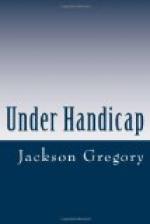Sitting there alone, his pipe dead between his teeth, Greek Conniston asked himself many questions which had never suggested themselves to his complacency before. And he answered them, one by one, without fear or favor. In what was he better than Brayley, than Toothy even? Was he a better man physically? No. Was he a better man morally? No. Was he a better man intellectually? He had thought he was; now he hesitated long before answering that question. Certainly he had had an education which they had missed. Certainly his intellect had been trained, in a fashion, by great men, by learned university professors. But was it any keener than Brayley’s and Toothy’s; was it any stronger; was it, after all, any more highly trained? In a crisis now was his intellect any better than theirs? In his present environment was it any better? And finally he answered that question as he had answered the others.
Was he a better man in the composite, in the grand total of manhood? Measured by all the standards by which men are measured, stripping off the superficialities of surface culture and clothes, the thin veneer of education which in his case, as in the cases of the great majority of young men who have been graduated from this or that university, had imparted only a sort of finish, a neat, gleaming polish, and no great metamorphosis of the inner and true being, was he a better man? If there was any one particular, no matter how small, in which Greek Conniston was a better man than the men among whom he had moved with careless contempt, he wanted to know what it was!
“I have been a howling young ass!” he told himself, his contempt suddenly swerving upon himself. “A conceited fool and a snob! Lordy, lordy, why didn’t somebody tell me—and kick me? A snob—a d—d, insufferable, conceited snob!”
Three weeks ago the things which Argyl Crawford had said to him would have amused the very self-satisfied young man. A week later, when something of the truth had begun to filter in dimly upon him, he would have felt hurt, insulted. Now he was ready to go to her, to thank her, to tell her that a fool was dead, that he hoped a man was being born.
“And I would right now,” he muttered to himself, “only I suppose that anything I said would sound like the braying of a jackass!”
The one thing which she had said to him which now returned with ever-increasing significance was the reason, as she had explained it, why he had been chosen to go with her to Rattlesnake Valley. Out of the dozens of men who worked under Brayley’s orders he was absolutely the only one who could be spared from the day’s work! Every other man had a quicker eye, a stronger body, a firmer hand; every other man was a better rider, a better herder, a better roper, a better all-round man. When there was work that must be done, man’s work, he was the one who could be spared from it.




